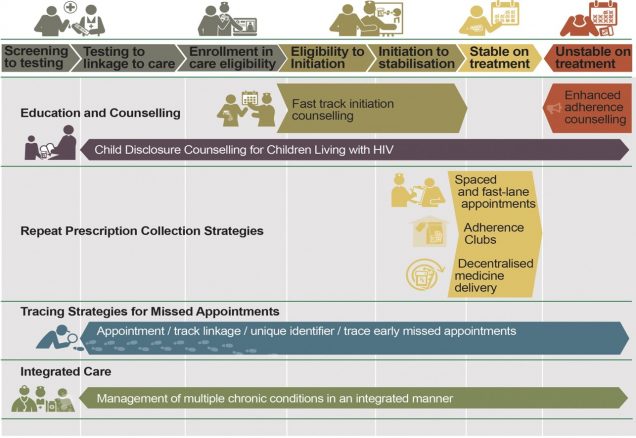South Africa
South Africa has been a leader in implementing innovative models of service delivery, with options that include appointment spacing and fast-track appointments, facility-based clubs, community-based ART groups, community ART distribution, DSD for adolescents, and services for key and priority populations. DSD models for adolescents living with HIV include the Youth Care Club Model (YCC), which provides adolescents access to clinical management, contraceptives, ART refills, routine health screenings, and psychological support in one visit. Other models include the Central Chronic Medicine Dispensing and Distribution (CCMDD) program, community pick-up points including private pharmacies, and mobile outreach services.
South Africa’s National Department of Health also recognizes the importance of enhancing its community-based models to address the needs of at-risk patients. The standardized package of care for patients at high risk includes daily and weekly home visits; spot pill counts; enhanced adherence counseling; clinical monitoring with viral load monitoring every two months; and decentralized pharmacovigilance.

AMBIT in South Africa
In collaboration with our partner organization, HE²RO, we are now exploring the current extent of DSD implementation in South Africa, what is known about the scale of implementation, and the existing criteria for scale-up. For this purpose, we are identifying relevant data sources (publications, project databases, Tier.Net, etc.). Our next step will be to use available data on patient numbers and characteristics, facility locations, facility capacity, costs, and other variables to make recommendations about the most efficient combinations(s) of models of care to be implemented in each district.
Image source: South Africa’s national package of differentiated service delivery for HIV and other chronic conditions (DOH Republic of South Africa, 2016)
Content adapted from: The CQUIN project for Differentiated Service Delivery in South Africa at Columbia University, Mailman School of Public Health